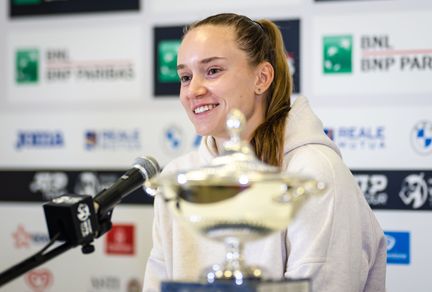She was serving for the match when a guy in the first row, sitting behind the red geraniums, inadvertently caught Aryna Sabalenka’s eye with the flashlight on his phone. She did not roll her eyes or offer cryptic words. And while Sabalenka eventually lost the point, she followed with a thundering ace outside.
Just when it looked like her forceful forehand had brought her to match point, a replay challenge (it was a millimeter long) gave Iga Swiatek a critical break point. There was no shoulder-slumping, no bad-body-language shrugging. On the next point, she smoked another ace down the middle. Finally, on the fourth match point, Sabalenka finally beat Swiatek on clay.
Champions Corner: How previous losses to Swiatek helped motivate Sabalenka
“To have this win, especially on clay, that’s something unbelievable,” Sabalenka said. “I’m really happy that I’m able to fight against her and I’m able to get these wins so it’s not like so super boring for people to watch our matches.”
For those unlucky enough not to see it, the 6-3, 3-6, 6-3 score in the Mutua Madrid Open final might suggest a match devoid of drama. Hardly. This was a magnificent contest, 116 minutes of pure, thrilling tennis between the two best players in the game. The crowd at Caja Magica rose to its feet early and often.
“It feels like the earth just shifted,” said Tennis Channel analyst Chanda Rubin. “That performance by Aryna Sabalenka was one for the ages.”
And while the 25-year-old Sabalenka will always hold her first Grand Slam singles title, earned in Melbourne back in January, close to her heart, she may come to cherish this one even more. The Hologic WTA Tour’s No.2-ranked player beat the World No.1 on her most comfortable and successful surface.
It was another important step in the continuing evolution of Sabalenka.
Swiatek had won 46 of her past 49 matches on clay and was coming off a straight-sets victory over Sabalenka 13 days ago in Stuttgart. But it’s Sabalenka -- 0-3 on the dirt (and 0-6 in sets) versus the 21-year-old -- who proved to be the steadier player in numerous pivotal moments. It’s Sabalenka who now comfortably leads the Race to the WTA Finals, with 4,830 points, followed by Elena Rybakina (3,276) and Swiatek (2,930).
How far has Sabalenka come in one year?
Heading into Rome a year ago, she was plagued by double faults and had won 10 matches. Sabalenka now has the best record among WTA Tour players at 29-4 record; Swiatek is next at 25-5.
She’s played seven events -- and reached the final five times. Previously, Sabalenka had never advanced to more than four finals in a single season. Moreover, she is the first player to get to five finals before the Italian Open since Victoria Azarenka in 2012.
Incredibly, there were five 3-0 runs in this match. Sabalenka and Swiatek won the first and second sets, respectively, with two of them. Sabalenka took a 3-0 lead in the third, but Swiatek leveled it at 3-all. When that happened, it was hard to set aside Sabalenka’s history of succumbing to nerves under pressure. But she was the one who closed with conviction.
‘‘I kind of expect something like that from Iga that she’s going to fight for the last point, that she’s going to try everything she can to win this match,” Sabalenka said in her post-match press conference. “I wasn’t really crazy about that, but it was really not easy moment for me. Super happy how I was able to mentally handle this situation and to keep fighting and keep trying and not getting really crazy about that situation.”
There were a dozen such moments throughout the match when Sabalenka could have quailed and shut it down. But she didn’t. Eyes narrowed, jaw set, she dialed in instead of checking out. Perhaps she was channeling her 2021 victory here, when she defeated another No.1, Ashleigh Barty, in the final. The only two of her 13 career titles that came on clay were in Madrid.
Some subtle adjustments from Stuttgart -- and the high-flying altitude of Madrid -- allowed her to change the narrative. Sabalenka took a few miles per hour off her forehand for safety and added four mph to her backhand. In the end, she was fearless, willing to accept a number of misses in return for winners when the openings presented themselves.
VAMOS ARYNA 💃@SabalenkaA is your 2023 @MutuaMadridOpen champion, defeating Swiatek, 6-3, 3-6, 6-3 🏆#MMOPEN pic.twitter.com/TOclRdBuOI
— wta (@WTA) May 6, 2023
“Sometimes it was about a few shots that I could play a little bit better,” Swiatek said afterward. “She played some shots that were risky. Maybe sometimes I could be more proactive, but honestly, I don't have any big regrets.”
For Sabalenka, waiting one or two balls more before unloading was the perfect risk-reward ratio.
“Yeah,” Sabalenka said, “I stick to the plan, and I think that was the key today, that I didn’t over-rush things and I was waiting for a better shot to go for powerful shots.”
This was the first time since 2000 that the No.1 and No.2 met in back-to-back tournaments. From 2016-2022, it only happened twice. Last year, Swiatek swept the clay tournaments in which she played -- Stuttgart, Rome and Roland Garros. The latter two should play appreciably slower than Madrid, not quite as conducive to Sabalenka’s power game.
As of Monday, Swiatek is ranked No.1 for 58 consecutive weeks. But this result trims her lead on Sabalenka. Swiatek will be defending 3,000 points in Rome and Paris while Sabalenka’s total is 480.
“I’d love to play [her] the final of every tournament,” Swiatek said. “Against Aryna with her game and both of us being so consistent, it’s going to happen anyway. I don’t know what tournament -- doesn’t matter for me.”
